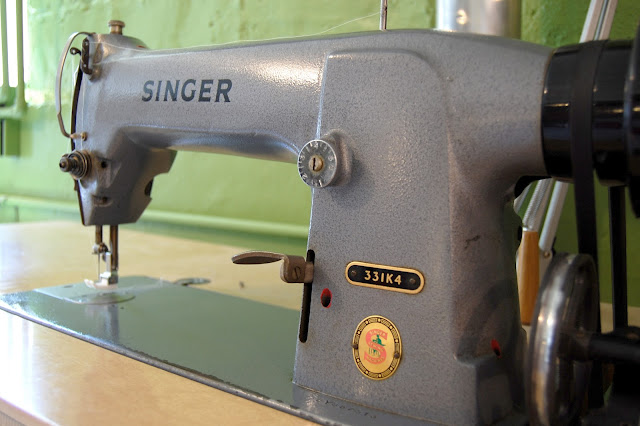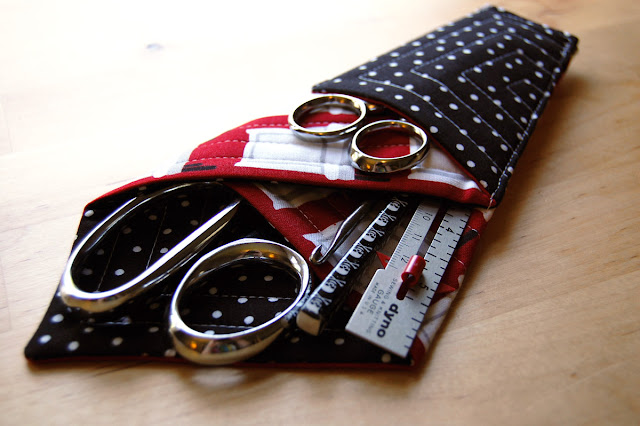Use It or Lose It: 1966 Singer 331K4
Just when I thought I had counted all of the vintage and antique machines here, I forgot to add the 1966 Singer 331K4 Industrial! This brings the machine count up to 15. Another machine that I absolutely love and don't want to live without.
Although this is a full-on industrial machine, its purpose is not to sew through thick fabrics or leather. The sole purpose of this machine is to sew F-A-S-T!
In fact, it sews SO fast that I only use this baby for sewing mostly straight seams. There's no going slow around curves with this thing.
Other than the fact that this machine was manufactured in Singer's Scotland plant in 1966, I really don't know that much else about it. I had always wanted to try an industrial machine, and found this one advertised locally from a business that was closing and liquidating, and she came home with me for less than half of what they normally sell for. And, like I said, I absolutely love her!
EDITED: I'm adding some more information about this machine for those of you that had questions. First, get the free SINGER Service Manual PDF here from SingerCo: https://www.singer.com/search/support?title=331k4 Some of the illustrations are not very clear in this download, but the Service Manual includes all the machine specs plus basic information about threading, needles, and the bobbin winder that came standard with this model.
Next, here's a quick threading guide. It is recommended that a thread stand be used with this machine to help the thread untwist before stitching. I have the original Singer Thread Unwinder No. 225258 stand on my machine, but you could use any stand, as long as it fits on the table.
From what I've seen and read, what looks like a thread spool on top of the machine is actually a thread guide.It is optional to use, but I have found the machine to stitch best when I use it.
And this thread guide MUST be used before continuing on the thread path to the tensioner, thread uptake lever, and on to the needle. Once I had the machine threaded properly it sewed like a dream.
The last bit of information to share is that this machine does not use standard 15X1 sewing machine needles, it uses Singer Industrial Machine Neeldes size 16X87. Just do an internet search to find places that stock the needles.
If you'd like to see some of the other machines in my collection, you can click back to read about these oldies but goodies:
#14. Singer 500A
#13. 1935 Singer 221
#12. c.1960's BERNINA 730 Record
#11. c.1950's Brother
#10. 1954 Singer 301
#8. 1954 Singer 319W
#7. 1957 Singer 221
#5. 1922 Singer 66
#3. Singer 114K103
#2. 1919 Singer 128









Comments
I just bought one of these at an auction.....it is fast you are right!
thanks for posting the service manual link!
That brings me to 6 machines, (and i'm not collecting them!)
Claire
I am an amatuer in sewing and am planning to get one sewing machine myself to make leather tote bags.
I came across an used Singer 331K4 which is in good condition and the seller is only willing to part for US$650.
Is this a reasonable price?
Please advise. Thank you!
- tp
Thanks, Melva
1. Is the 331 an newer iteration of the 31-15?
2. Is the 331 a manual oiler or an auto oiler?
3, If it is a manual oiler is it necessary to use a drip pan with the stand?
Thanks for your help.
HWP
Best of luck to you! - Erika
To HWP:
Someone on another forum was wondering if there was a 31-15 with reverse and several folks suggested the 331K4 was as close as you could get.
I've personally sewn thick layers with the 331k4 machine and it does fine with a large needle and heavy thread.
It is a manual oiler. Mine does have a tray, but I've never noticed oil splatter in it.
Like the 31-15 (I learned to sew on this antique machine 25 years ago), it's a simple, but reliable mule of a machine.
I love mine and got it for a great price ($125 with table and bobbin rewinder, I added a light and spool tower and spent a day tuning up the laminate underside and adjusting the tension).
I've seen similar set ups like mine consistently in the $500 range. Heads alone around $350.
You do have to make a minimum purchase (I think it's $25.00). They also offer outstanding customer service. When you place an order they request your phone number in case there are problems with the order. They really do call if they need to.
I have no affiliation with the company--I'm just a very happy customer who has dealt with them on several occasions needing parts for a 31-15 and a 20u33.
I've never had any issues sewing with the regular weight threads and medium weight cottons, and this machine does sew fast. Without modifying the motor/pulley system, this machine does not like to sew slowly at all. Best of luck to you! - Erika
I really hope you can help. I have just bought an industrial sewing machine. It's an oldie but sews like a dream. It gallops along like a racehorse. I have been trying to find the manual for it. No luck so far, this is where I desperately need your help. My machine is a
Singer 31K5. I did say an oldie. I love it. Please say you have the manual I need, or know where to get it. I tried Singer, they didn't even know what I was talking about. Please, please, please
Many thanks
Chris
1. Do you know where i can purchase these parts
take up lever guard part number 139766 plus 2 screws part number335
arm spool pin part number 53229 2 off
2. is there a chat room or a forum that i could join so that i could help with these problems.
Many thanks
George
I wondered if I could change my Singer 331k4 using system by adding motor to operate it because my machine is too old and works only on feet.. and if it ,so what kind of motors could operate this machine?
By the way...my machine was a gift from my mother after my wedding(she died 2 years ago)..and l love it so much.If you have any answer to my question about the way that I can make this machine works electrically..please reply.
Thank you
I don't sew fast but I DO sew thick and often stepping up and down different levels !
It can do this flawlessly but sometimes it goes completely wrong and I could go mad trying to get it back into sync !
More often than not it's the top tension !
I use a 40 weight thread and some pretty big needles too !